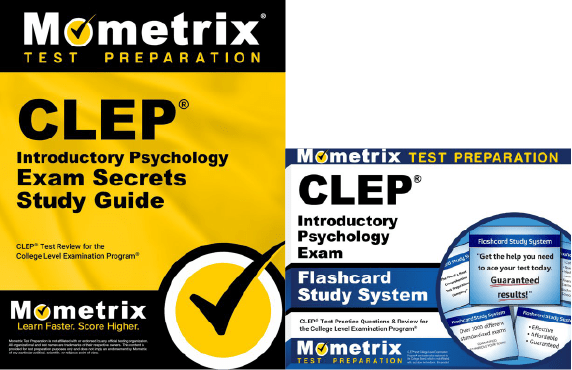If you need help studying for the CLEP® Introductory Psychology exam or just want some more information about what the exam is like, you’ve come to the right place!
Click below to take a free CLEP Introductory Psychology practice test!
What is a CLEP Test?
A CLEP exam helps you test out of certain intro courses in college. When you pass a CLEP exam, it proves that you know enough about that topic to move on to a more advanced course, which can save you a lot of time toward your degree!
Taking the CLEP Introductory Psychology exam can allow you to bypass certain intro courses in psychology.
What’s on the Exam?
First, let’s talk about the questions on the exam. There are 95 multiple-choice questions total, but some of the questions will NOT count toward your score. Why is that?
The unscored questions on the CLEP exam are there to determine if they’re good enough questions to add to future versions of the test.
The trick is that you won’t have any way of knowing which questions are scored and which ones aren’t—they will all appear like scored questions throughout the test.
The time limit for the test is 90 minutes (1.5 hours). There aren’t any scheduled breaks, but you’re free to take restroom breaks as needed!
Let’s take a closer look at the different sections of the Introductory Psychology test:
History, Approaches, and Methods
11%-12% of the exam
- History of psychology
- Biological, biopsychosocial, behavioral, cognitive, humanistic, and psychodynamic approaches
- Experimental, clinical, and correlational research
- Ethics in research
Biological Bases of Behavior
8%-9% of the exam
- Endocrine system
- Etiology
- Functional organization of the nervous system
- Genetics
- Neuroanatomy
- Physiological techniques
Sensation and Perception
7%-8% of the exam
- Attention
- Somesthesis, olfaction, gustation, and vestibular system
- Perceptual development
- Perceptual processes
- Vision and audition
- Sensory thresholds and adaptation
States of Consciousness
5%-6% of the exam
- Hypnosis and meditation
- Psychoactive drug effects
- Sleep and dreaming
Learning
8%-9% of the exam
- Biological bases
- Classical conditioning
- Cognitive process in learning
- Observational learning
- Operant conditioning
Cognition
8%-9% of the exam
- Intelligence and creativity
- Language
- Memory
- Thinking and problem-solving
Motivation and Emotion
5%-6% of the exam
- Biological bases
- Hunger, thirst, sex, and pain
- Social motivation
- Theories of emotion
- Theories of motivation
Developmental Psychology Across the Lifespan
8%-9% of the exam
- Physical, cognitive, social, and moral development
- Gender identity and sex roles
- Heredity-environment issues
- Longitudinal and cross-sectional research
- Theories of development
Personality
7%-8% of the exam
- Assessment techniques
- Growth and adjustment
- Personality theories and approaches
- Self-concept and self-esteem
Psychological Disorders and Health
8%-9% of the exam
- Affective disorders
- Anxiety disorders
- Dissociative disorders
- Eating disorders
- Health, stress, and coping
- Personality disorders
- Psychoses
- Somatoform disorders
- Theories of psychopathology
Treatment of Psychological Disorders
6%-7% of the exam
- Behavioral therapies
- Biological and drug therapies
- Cognitive therapies
- Community and preventive approaches
- Psychodynamic and humanistic therapy approaches
Social Psychology
9%-10% of the exam
- Aggression/antisocial behavior
- Attitudes and attitude change
- Attribution processes
- Conformity, compliance, and obedience
- Group dynamics
- Interpersonal attraction
- Stereotypes, prejudice, discrimination, prosocial behavior
Statistics, Tests, and Measurement
3%-4% of the exam
- Descriptive statistics
- Inferential statistics
- Measurement of intelligence
- Reliability and validity
- Samples, populations, and norms
- Types of tests
How to Register
To register for the test, you’ll need to create an account on the College Board’s website. From there, you can sign into the My CLEP student portal and register for the exam.
You’ll also have the option to send your final score to two institutions for free.
CLEP Scores
The CLEP Introductory Psychology exam is scored using a scaled scoring method. Here’s how it works:
For every question you answer correctly, you get one point added to your raw score. At the end of the test, your final raw score will be converted to a scaled score. This scaled score will range somewhere between 20 and 80.
The reason your raw score is converted to a scaled score is because everyone that takes the test is given a slightly different set of questions. Since everyone has a different arrangement of questions, and because some questions are harder than others, converting your raw score to a scaled score ensures a more even playing field.
FAQs
What is CLEP?
CLEP stands for College-Level Examination Program. This program was set up by the College Board to help students earn college credits without taking college courses.
Are CLEP exams hard?
It depends on which one you take! Some CLEP exams are harder than others due to the material being covered. For example, the Chemistry and Western Civilization II tests are considered to be the hardest, while the Spanish Language and College Composition tests are thought to be the easiest.
How many questions are on the CLEP Introductory Psychology exam?
The exam contains 95 questions.
What is the time limit for the CLEP Introductory Psychology exam?
The exam is timed at 90 minutes.
What is the passing score for the CLEP Introductory Psychology exam?
It’s recommended that you get a final score of at least 50.
How much does the CLEP Introductory Psychology exam cost?
The testing fee is $97.
CLEP® and College-Level Examination Program® are trademarks registered by the College Board, which is not affiliated with, and does not endorse, this page.



 CLEP Study Guide
CLEP Study Guide CLEP Flashcards
CLEP Flashcards